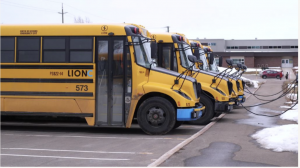Citing Growing Evidence of Harm to Child Health and Learning Ability, Advocates Call for an End to Diesel School Buses
Healthy Environments for Learning Day: Environment and Child Health advocates call on all governments to accelerate the switch to electric school buses
Switching to an all electric school bus fleet should be an obvious choice nationwide to protect the health of children, now and into the future.”
TORONTO, ONTARIO, CANADA, April 27, 2023/EINPresswire.com/ -- Health and environmental advocates today called on communities, school boards and governments at every level to accelerate the electrification of school buses, replacing tens of thousands of diesel-powered school buses spewing toxic fumes that can seriously harm child health and interfere with learning.— Dr. Erica Phipps, Executive Director, CPCHE
Led by the Canadian Partnership for Children’s Health and Environment (CPCHE), a coalition of 34 organisations made the goal of all-electric school bus fleets in Canada the central focus of this year’s national Healthy Environments for Learning Day (April 27).
The joint call for urgent action by relevant decision-makers nationwide (in full at https://bit.ly/41xOBes) closely follows the publication in January of new scientific evidence from British Columbia that even “brief diesel exhaust exposure acutely impairs functional brain connectivity” (http://bit.ly/3zFhHMr). While adult subjects were studied, the new research raises further concerns about impaired brain function and learning ability of children breathing diesel fumes.
Other research has warned that diesel exhaust may impede child neurodevelopment, spatial learning, attention and memory, and contributes to a myriad other physical and mental health problems (detailed below), as well as climate change.
“Faced with the existential threat posed by climate change and mounting scientific evidence of the harm to children caused by traffic-related air pollution, including diesel exhaust, more comprehensive and urgent action is needed to bring electric school bus transportation to all communities across Canada,” the declaration says.
It underlines that “electric school buses are a viable solution that eliminates diesel bus emissions and exemplifies local action on climate change.”
The majority of Canada’s 50,000 school buses use diesel fuel. Each year, school buses make 792 million trips to carry roughly 2.2 million children to and from school.
Says CPCHE Executive Director Erica Phipps: “Buses operating close to schools mean that all children, not just those riding the buses, can be exposed to and affected by diesel exhaust.”
“The financial savings achieved over time by switching to cleaner, more sustainable school transportation more than make up for the initial cost of an electric bus. By switching to electric school buses, we can help our children thrive physically and intellectually while protecting the environment for generations to come with a tangible, visible action on climate change.”
CPCHE and its collaborators today called on all levels of government to:
* Accelerate the shift to all electric school bus fleets across Canada, through policy and funding measures that support electric bus procurement, operation and infrastructure
* Prioritise electric school bus adoption in communities facing disproportionate exposure to traffic-related air pollution
* Promote and celebrate the electric school bus as a way for children, families and communities to learn about and participate in climate action through the transition to zero-emission transportation in Canada
Says Dr. Phipps: “Given what we know about the child health effects of diesel exhaust and the risks posed by climate change, switching to an all electric school bus fleet should be an obvious choice nationwide to protect the health of children, now and into the future.”
A litany of child health consequences
The World Health Organization has recognized diesel exhaust as a human carcinogen. And Health Canada’s Human Health Risk Assessment concludes that exposure to diesel exhaust causes lung cancer and is linked to bladder cancer.
Health Canada has also documented a link between traffic-related air pollution (TRAP) and certain types of cancer including childhood leukemia and, in adults, breast cancer.
Acute and chronic exposures to diesel exhaust are linked to various harms including reduced lung function, inflammation of the airways, the risk of child asthma, chronic obstructive pulmonary disease, increased sensitivity to allergens, heart disease, arrhythmia, ischemia and myocardial infarction.
Toxicological research on diesel exhaust has also shown potential links to reproductive and developmental effects, and altered hormone levels and gene expression.
Today’s declaration notes that children are more vulnerable than adults to the health effects of air pollution, including diesel exhaust, “because their bodies are growing, their lungs are developing and because they breathe in more air per kilogram of body weight.”
Furthermore, “while Canadian data are limited, research shows that children in Canada who experience poverty, racialization and other forms of marginalization are often at greater risk because of disproportionate exposure to traffic-related air pollution.”
Researchers have concluded that prenatal and early life exposures to traffic-related air pollution are likely implicated in autism spectrum disorder. Researchers have also found associations between TRAP and deficits in intelligence, memory, attention and behaviour, as well as symptoms of anxiety and depression.
Children can also experience indirect barriers to learning as an impact of diesel exhaust, which contribute to thousands of asthma symptom days – is the leading cause of school absenteeism – and child acute bronchitis episodes across Canada every year.
By the numbers
* 0.2%: percentage of electric model school bus sales in Canada
* 65%: Estimated battery pack price drop, 2018 to 2030
* $2.75 billion: Total federal investments over five years beginning in 2021 to support the transition of public transit and school buses to zero emission vehicles
* 90: Tonnes of carbon dioxide (CO2) emitted by a diesel school bus over its 12-year expected lifespan, equal to the greenhouse gas emissions of 23 passenger vehicles in that same time
* 0: Safe level for exposure to particulate matter and some other diesel exhaust contaminants
* 2,200,000: Estimated acute respiratory symptom days caused by diesel emissions, all Canadians every year
* 170,000: Estimated asthma symptom days caused by diesel emissions in Canada every year
* 3,000: Estimated child acute bronchitis episodes caused by diesel emissions in Canada every year
* 262,000+: new jobs expected in the clean transport industry by 2030
* 160-240 km: Approximate range of new electric school buses on the market. (90 km: Average daily school bus distance travelled in Ontario – two trips, one in the morning, one in the afternoon)
* 52%: Savings per kWh available when electric school buses are charged in mid- and off-peak demand hours
News release in full: https://bit.ly/3HewkuF
Terry Collins
Terry Collins & Assoc. inc
+1 416-878-8712
email us here
My Electric School Bus



